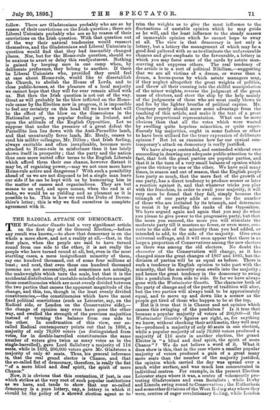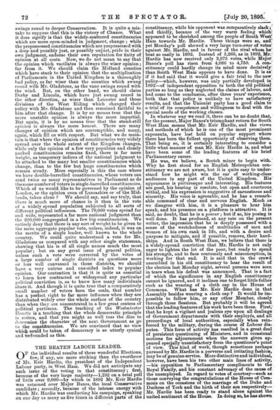THE RADICAL ATTACK ON DEMOCRACY. T HE Westminster Gazette bad a
very significant article on the first day of the General Election,—before any result was known,—to show that democracy is on the whole a mere show, and not a reality at all,—that, in the first place, when the people are said to have turned round from one side to the other, it is not really the people who have turned round at all, but, even in the most startling cases, a, mere insignificant minority of them, say one hundred thousand, out of some four millions at least ; and next, that even these one hundred thousand persons are not necessarily, and sometimes not actually, the makeweights which turn the scale, but that it is the accidental distribution of unstable-minded electors amongst those constituencies which are most evenly divided between the two parties that causes the apparent magnitude of the change, and this, too, though in the least evenly divided constituencies,—the constituencies which have the most fixed political convictions (such as Leicester, say, on the Radical side, or London on the Conservative side),— the change of opinion may even have gone the other way, and swelled the strength of the previous majorities instead of turning the balance from one side to the other. In confirmation of this view, our so- called Radical contemporary points out that in 1886, a majority of only 78,000 voters (as distinguished from votes, for in double-barrelled constituencies the same number of voters give twice as many votes as in the single-barrelled), gave Lord Salisbury a majority of 116 seats, while in 1892, 200,000 voters gave Mr. Gladstone a majority of only 40 seats. Thus, his general inference is, that the real grand elector is Chance, and that the so-called fiat of democracy, therefore, is really the fiat "of a mere blind and deaf spirit, the spirit of mere Chance."
Now, it is obvious that this contention, if just, is one which strikes at the very root of such popular institutions as we have, and tends to show that our so-called democracy is a pure lottery, nay, a lottery in which it should be the policy of a shrewd election agent so to trim the weights as to give the most influence to the fluctuations of unstable opinion which he may guide as he will, and the least influence to the steady masses of immovable opinion which he cannot hope to sway at all. The view is that democracy is not only a lottery, but a lottery the management of which may be a good deal paltered with so as to eliminate the unfavourable chances and give emphasis to the favourable, a lottery in which you may force some of the cards by astute man- ceuvring and suppress others. The real tendency of the article is to a sort of political Nihilism,—suggesting that we are all victims of a dream, or worse than a dream, a hocus-pocus by which astute managers may, if they neglect altogether the great weights of politics, and throw all their cunning into the skilful manipulation of the minor weights, reverse the judgment of the great mass of electors, and steer the ship by the help mainly of the judgments of those who are most easily blown to and fro by the lighter breaths of political caprice. Mr. Courtney surely should score some advantage from the teaching of this article, and make it the text of a great plea for proportional representation. What can be more obvious than that all the votes which were wasted by swelling quite hopeless minorities, or quite super- fluously big majorities, ought in some fashion or other to have been utilised for the truer expression of deliberate opinion ? But let us examine how far our cynical con- temporary's attack on democracy is really justified.
We have always contended, and contended without ever succeeding in drawing any adequate public attention to the fact, that both the great parties are popular parties, and that it is the turn of a very small balance of opinion which gives the victory to one or the other. We have said many times, in season and out of season, that the English people love party so much, that the mere fact of the growth of one party, has a direct tendency to produce sooner or later a reaction against it, and that whatever tricks you play with the franchise, in order to swell your majority, it will very soon be found that they fail, simply because the triumph of one party adds at once to the number of those who are irritated by its triumph, and determine to resist it by swelling the ranks of the Opposition. We have argued again and again that you may do what you please to give power to the progressive party, but that the more you succeed, the more you will stimulate the moderate party till it musters no fewer, or even more, con- verts to the side of the minority than you had added, or intended to add, to the side of the majority. Give even universal suffrage, and it will soon appear that there is as large a proportion of Conservatives among the new electors as there was among the old electors. No doubt the character of the Conservatism will change, as it has changed since the great changes of 1867 and 1885, but the division of parties will be as equal as before. There is such a tendency in English opinion to take part with the minority, that the minority soon swells into the majority ; and hence the great tendency in the democracy to swing like a pendulum from side to side. So far we have always gone with the Westminster Gazette. The character both of the party of change and of the party of tradition will alter, but the two parties will always tend to be approximately equal, and to move up and down like a seesaw as the people get tired of those who happen to be at the top. But is it true that it is Chance and not opinion which causes this swinging of the pendulum ? Is it true that because a popular majority of voters of 200,000—if the Westminster Gazette's figures are right, as, for anything we know, without checking their arithmetic, they well may be—produced a majority of only 40 seats in one election, while a popular majority of only 78,000 voters produced a majority of 116 seats in another election, the grand. Elector is "a blind and deaf spirit, the spirit of mere Chance" ? We do not believe a word of it. What it does show is this, that in the case where a smaller popular majority of voters produced a gain of .a great many more seats than the number of the majority Justified, the opinion which carried the day was spread over a much wider surface, and was much less concentrated in individual centres. Por example, in the present Election Leicester stays where it was, a centre of vehemently pro- testing Gladstonians and even Socialists ; while Derby and Lincoln swing round to Conservatism ; the Rotherham and someother divisions of the West Rtd trig stay where they were, centres of eager revolutionary fetling, while London swings round to deeper Conservatism. It is quite a mis- take to suppose that this is the victory of Chance. What it does signify is that the widely-scattered constituencies which are more open-minded in judgment, change ; while the prepossessed constituencies which are prepossessed with a deep and possibly just, or possibly unjust, pride in their own judgment, endorse their own reputation for fixity of opinion at all costs. Now, we do not mean to say that the opinion which vacillates is always the wiser opinion ; far from it. We should claim the Midland counties which have stuck to their opinion that the multiplication of Parliaments in the United Kingdom is a thoroughly had policy, as far wiser than the counties which swung round with Mr. Gladstone, as the vane swings round with the wind. But, on the other hand, we should claim Derby and Lincoln, which have just swung round in the other direction, as wiser than Leicester and those divisions of the West Riding which changed their policy with Mr. Gladstone and then remained faithful to him after that change. It is by no means true that the more unstable opinion is always the more impartial. But again, it is by no means true that the stand-still opinion is always the more honest. There are many changes of opinion which are contemptible, and many, again, which fill us with respect. But what we do main- tain is that where the opinion of constituencies very widely spread over the whole extent of the Kingdom changes, while only the opinion of a few very populous and closely packed constituencies remains fixed, there is far more weight, as temporary indices of the national judgment to be attached to the many but smaller constituencies which change, than to the few but huge constituencies which remain steady. More especially is this the case where we have double-barrelled constituencies, whose voters can send twice as many representatives to Parliament as do the same number of voters in single-barrelled constituencies. Which of us would like to be governed by the opinion of London, or the opinion even of Lancashire or of the Mid- lands, taken alone ? We should say, and say truly, that there is much more of chance in it than in the vote of a widely spread population subjected to all sorts of different political influences. The 78,000 votes spread far and wide, represented a far more national judgment than the 200,000 congregated in a few big constituencies. We entirely deny that there is any sort of weight to be given to the mere aggregate popular vote, unless, indeed, it was on the merits of a single leader, well known to the whole country. We could quite understand a vote for Mr. Gladstone as compared with any other single statesman, showing that his is of all single names much the most popular ; but on any great issue of general politics, unless such a vote were corrected by the votes of a large number of single districts on questions more or less well canvassed in those districts, we should have a very untrue and one-sided index to popular opinion. Our contention is that it is quite as essential to learn how contracted or widespread any particular political conviction is, as to know how many individuals share it. And though it is quite true that a comparatively small number of voters turn the scale, that number has a perfect right to far more influence when they are distributed widely over the whole surface of the country than when they are concentrated in a few great centres of political partisans. The teaching of the Westminster Gazette is a teaching that the whole democratic principle is rotten, and that you might as well toss the dice to determine the character of the next Government as go to the constituencies. We are convinced that no view which could be taken of democracy is so uttetly cynical and unfounded as this.



































 Previous page
Previous page